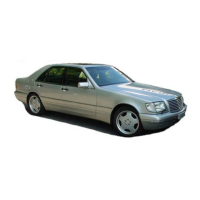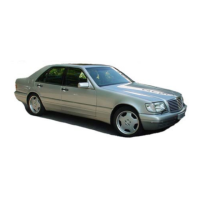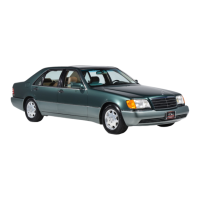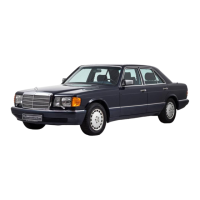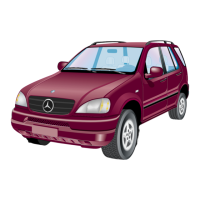
Do you have a question about the Mercedes-Benz 380 SE 1984 and is the answer not in the manual?
| Brand | Mercedes-Benz |
|---|---|
| Model | 380 SE 1984 |
| Category | Automobile |
| Language | English |
Overview of vehicle controls and their functions, with detailed page references.
Details on gauges, warning lamps, and indicators on the instrument panel.
Explanation of master and supplementary keys and their uses.
Details on the flat key and its recommended usage.
Information on how to obtain replacement keys for the vehicle.
Procedures for opening and locking vehicle doors from outside and inside.
Operation of the central locking system for doors, fuel flap, and trunk.
How to switch the alarm system on/off and its functions.
Description of front seat adjustment switches and operation.
Details on seat cushion, seatback, and memory adjustment features.
How to recall stored seat positions using memory buttons.
Adjusting seat height, position, and mirrors, plus seat belt fastening.
Instructions for adjusting and removing front and rear head restraints.
Details on adjusting the rear seat in 500 SEL models.
Description of orthopedic seats with inflatable air cushions and their adjustment.
Information on the rear seat arm rest and its removal.
Details on the front seat arm rest and its three positions.
Operation of front and rear seat heaters, controls, and battery notes.
Warning system, fastening, and adjustment for seat belts.
Seat belt inertia reel, functional test, and safety notes.
Explanation of the SRS system, including airbag and tensioning retractor.
Important warnings and advice regarding SRS system modifications and service.
Details on steering lock operation, key positions, and warnings.
Operation of the lighting switch for various external lamps.
Functions of the combination switch for lights, turn signals, and flashers.
Operation of the windshield wiper and washer system.
How to set, cancel, and resume speed with the cruise control system.
Overview of automatic climate control system, air outlets, and operation.
How to adjust interior temperature and fan speed, plus system functions.
Explanation of economy and normal settings for ventilation, cooling, and heating.
Using multi-level settings for defrosting and air distribution.
Operation of the defrosting function for windshield and side windows.
How to adjust exterior mirrors on both the driver and passenger sides.
Adjusting the inside rear view mirror for normal and anti-glare night positions.
Usage of sun visors for glare protection and vanity mirror lights.
Operation of the electric sliding roof and emergency manual operation.
Operation of front and rear interior lamps with different switch positions.
How to operate the heated rear window and its effect on the battery.
How to use the vehicle's lighter.
Caution regarding the use of the shelf below the rear window for carrying objects.
Operation of power windows using center console and door switches, including safety switch.
Explanation of the radio's electronic controls, buttons, and display.
How to turn the radio on/off, adjust tone, and tune to stations.
Using the automatic station seeker bar for finding radio stations.
How to select radio stations by directly entering their frequencies.
Using manual tuning and safety notes for drivers.
Storing and recalling radio stations using push buttons.
Details on stereo indicator, automatic mono switch, and tape cassette playback.
How to set the vehicle clock and program the radio timer.
Operation of the automatic antenna and its height adjustment.
Essential checks for fuel, tires, fluids, battery, and lighting before any trip.
Instructions for hood operation and parking brake usage.
Regular checks for fuel supply, tire pressure, fluid levels, and battery.
Important precautions for the catalytic converter to prevent damage and emissions.
Procedures for starting cold/hot engines and turning the engine off.
Explanation of automatic transmission operation, selector lever positions, and kickdown.
Detailed explanation of selector lever positions and notes on shifting.
Notes on power assistance when engine is off and tire wear/pressure importance.
Advice on aquaplaning, tire friction on wet/icy roads, and using brakes on declines.
Tips for braking after hard stops, parking brake checks, and wear indicators.
Function of indicator lamps, oil pressure, coolant temperature, and emission control.
Advice for driving the first 1500 km/1000 miles for optimal engine performance.
How to use the economy gauge to monitor fuel consumption tendency.
Steps for winterizing the car, including oil, coolant, battery, and tires.
Essential advice for driving safely on slippery or icy roads, avoiding cruise control.
Guidelines for using tire chains, including speed limits and mounting.
Information on the Mercedes-Benz service network when traveling abroad.
Overview of the scheduled maintenance system based on mileage and time intervals.
Details on inspection, lubrication, and service intervals for routine maintenance.
Recommendations for engine oil and filter changes based on mileage and time.
Adjusted maintenance intervals for severe driving conditions.
Description of non-scheduled maintenance service components.
Specific maintenance measures like brake fluid renewal and coolant checks.
Importance and quality of genuine Mercedes-Benz spare parts.
How to protect the vehicle's paintwork and underbody from external influences.
Steps for washing the vehicle, including removing residues and rinsing.
Methods for removing tar stains and cleaning windows.
Care instructions for plastic parts, headliner, and rubber components.
Proper cleaning methods for seat belts.
Cleaning the steering wheel, instrument cluster, and selector lever.
How to clean leather and velour upholstery, including special care.
Recommendations for waxing paintwork and using touch-up sticks for minor repairs.
How to clean light alloy wheels and remove stubborn marks.
Cleaning and care for chrome-plated and aluminum ornamental moldings.
Step-by-step guide for removing and installing the rear seat cushion.
Instructions on how to remove the front and rear ash trays.
Where the first aid kit is stored and how to access it.
Recommendations for using roof racks and advice from the dealer.
Location and components of the spare wheel, jack, and tool kit.
Step-by-step guide for changing a wheel, including safety precautions.
Importance of tire pressure, temperature changes, and recommended settings.
Information on tire specifications, rotation, and warning about slow leaks.
Essential frequency for tire pressure checks and considerations for hot tires.
Correct torque for wheel bolts and checking tire pressure on cold tires.
Procedure for checking engine oil level, including dipstick use and level marks.
How to add coolant, including warnings about hot engines and pressure caps.
How to visually check the coolant level in the reservoir.
Procedure for checking automatic transmission fluid level, emphasizing cleanliness and temperature.
How to adjust headlamps and replace bulbs for the vehicle.
Detailed instructions for replacing bulbs in turn signals, fog lamps, and sealed-beam units.
How to replace bulbs in tail lamp assemblies and license plate lamps.
Procedure for replacing the trunk lamp bulb.
How to replace bulbs in interior, sun visor, and glove compartment lamps.
Information on fuse box location, fuse replacement, and battery checks and maintenance.
Details on spark plugs used in the vehicle and advice from the dealer.
How to release wiper blades and deal with heavy snow accumulation.
Manual operation of the sliding roof in case of electrical malfunction.
Procedure for manually unlocking the fuel filler flap if central locking fails.
Step-by-step guide for jump starting a discharged battery using jumper cables.
Important safety warnings regarding battery acid and hydrogen gas during jump starting.
Information on towing eyes and safe towing practices for the vehicle.
Procedure for starting the engine by towing or pushing the vehicle.
Recommendations for towing the vehicle, including distances, speeds, and drive shaft disconnection.
Explanation of the vehicle data cards and their importance for service.
Overview of the vehicle's warranty coverage, including new vehicle and emission systems.
Where to find certification, identification, chassis, engine, and emission control tags.
Specifications for the electrical system components and vehicle weights.
Detailed technical data for engine, transmission, steering, rims, and tires.
Specifications for electrical system and main vehicle dimensions.
Technical specifications for engine, transmission, and steering systems.
Technical data for rims, tires, and electrical system components.
Key main dimensions for the 500 SEL and 500 SEC models.
Total engine oil capacity and recommended oil grades based on ambient temperature.
Capacities and types of lubricants for rear axle, power steering, hubs, etc.
Fuel tank and cooling system capacities for different models.
Suitability of engine oils and initial fill procedures for new vehicles.
Importance of replacing brake fluid annually due to moisture absorption.
Information on coolant mixtures, anti-corrosion/antifreeze, and protection levels.
Braking performance data for the 380 SE under various conditions.
Braking performance data for 500 SEL/SEC under various conditions.
Explanation of tire traction grades (A, B, C) for stopping ability on wet surfaces.
Explanation of tire temperature grades (A, B, C) for heat resistance.
Information on fuel type, engine oil, and automatic transmission fluid.
Details on coolant, common bulb types, and spark plug recommendations.
Recommendations for tire pressure for normal and maximum loads in summer and winter.




